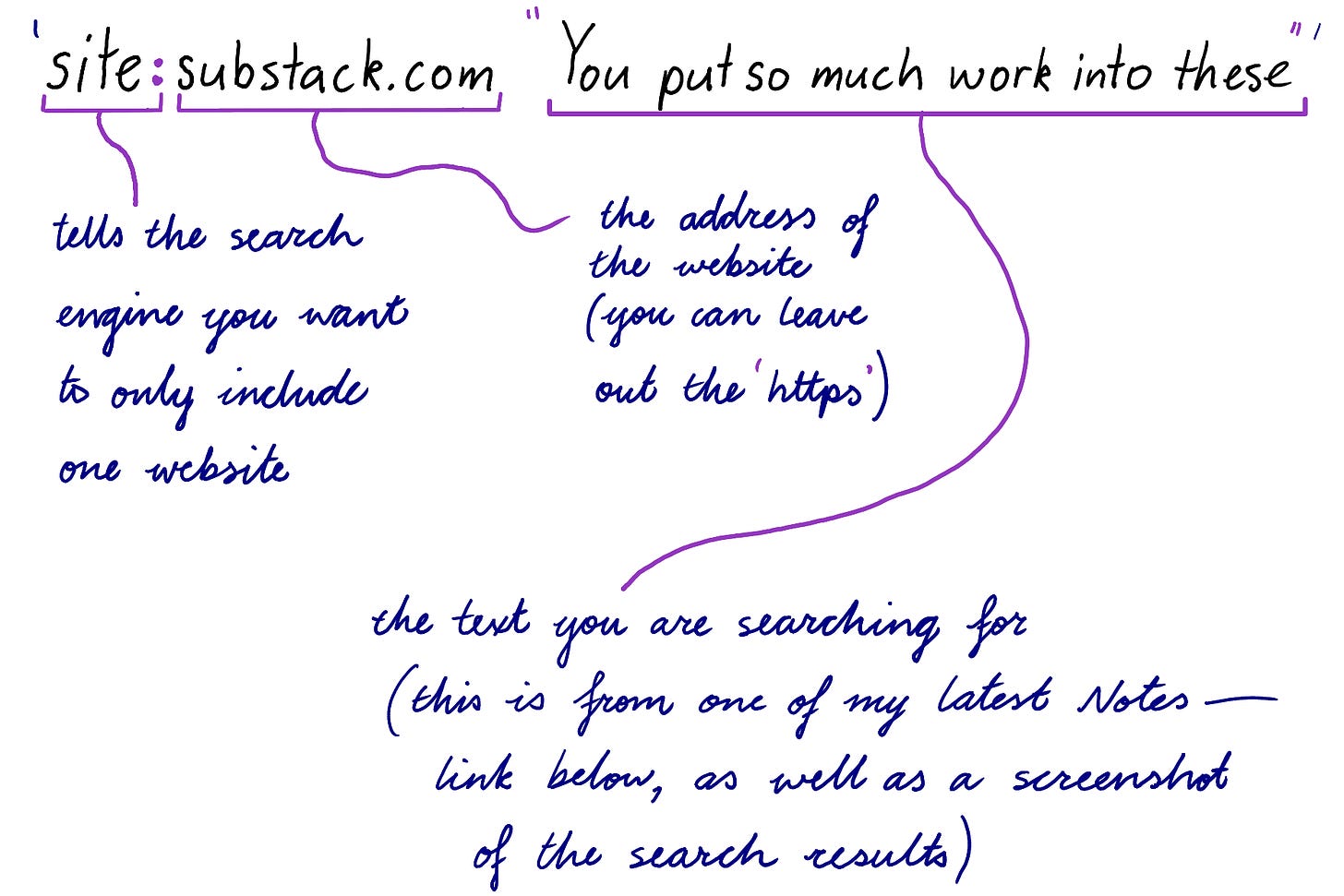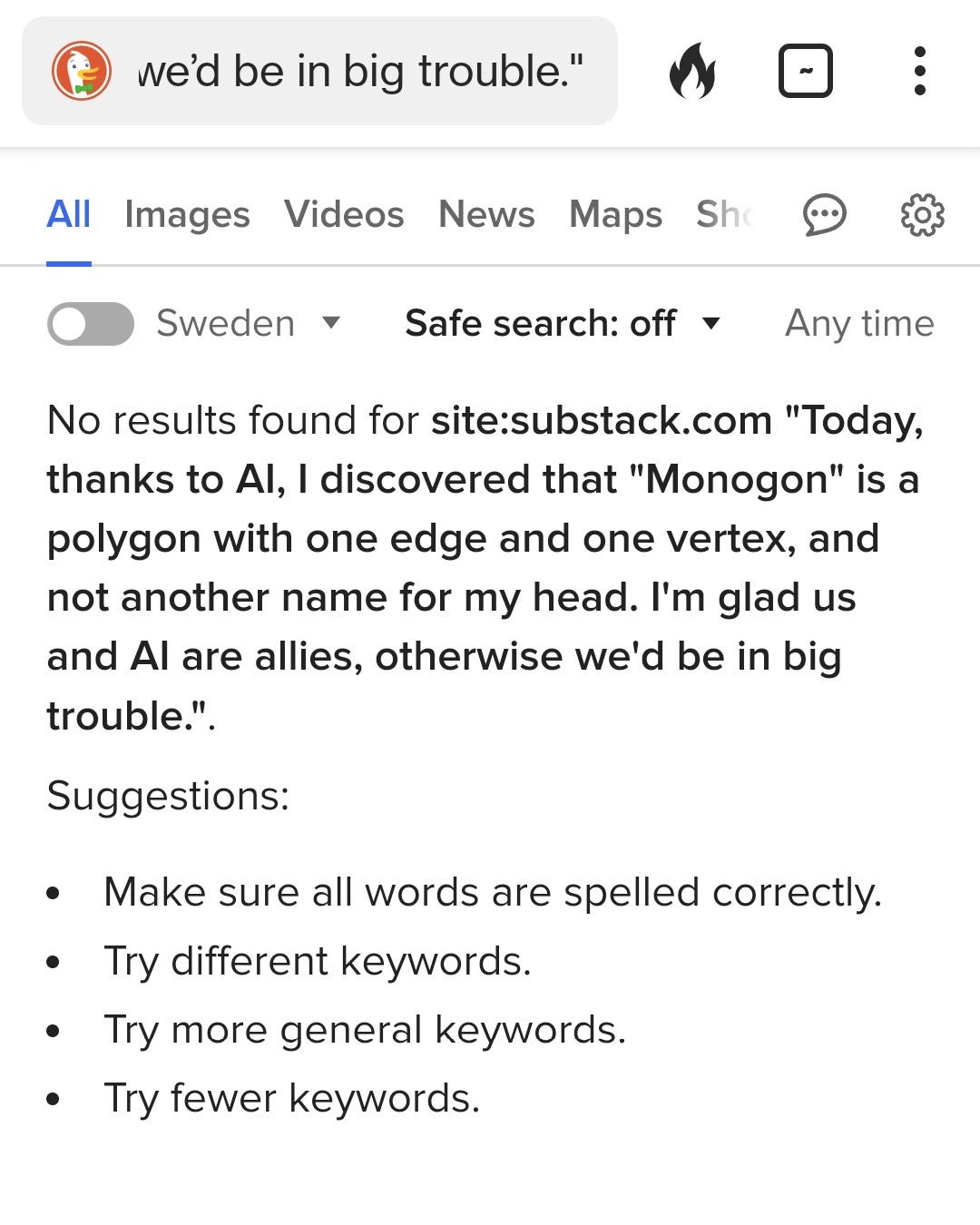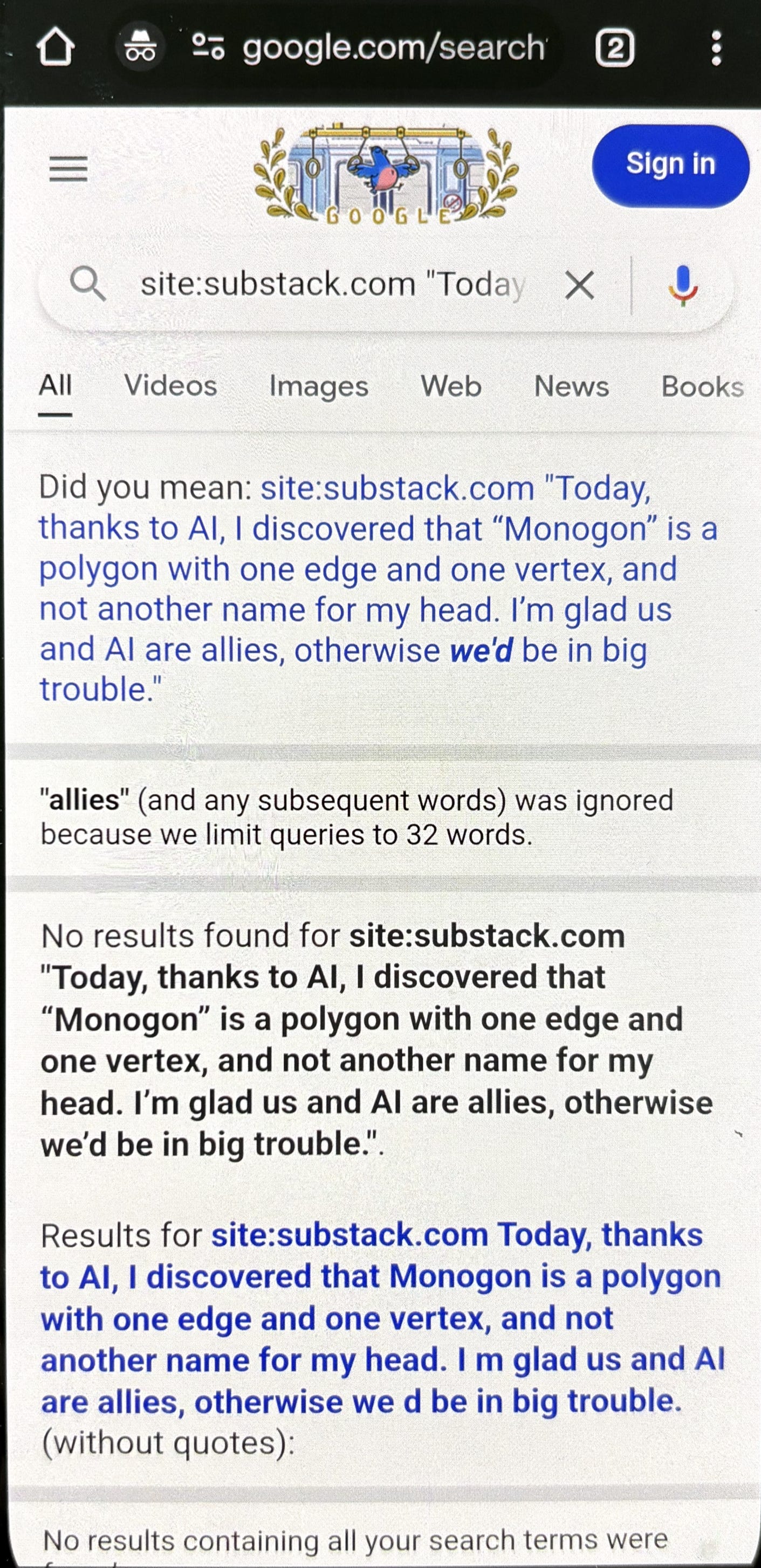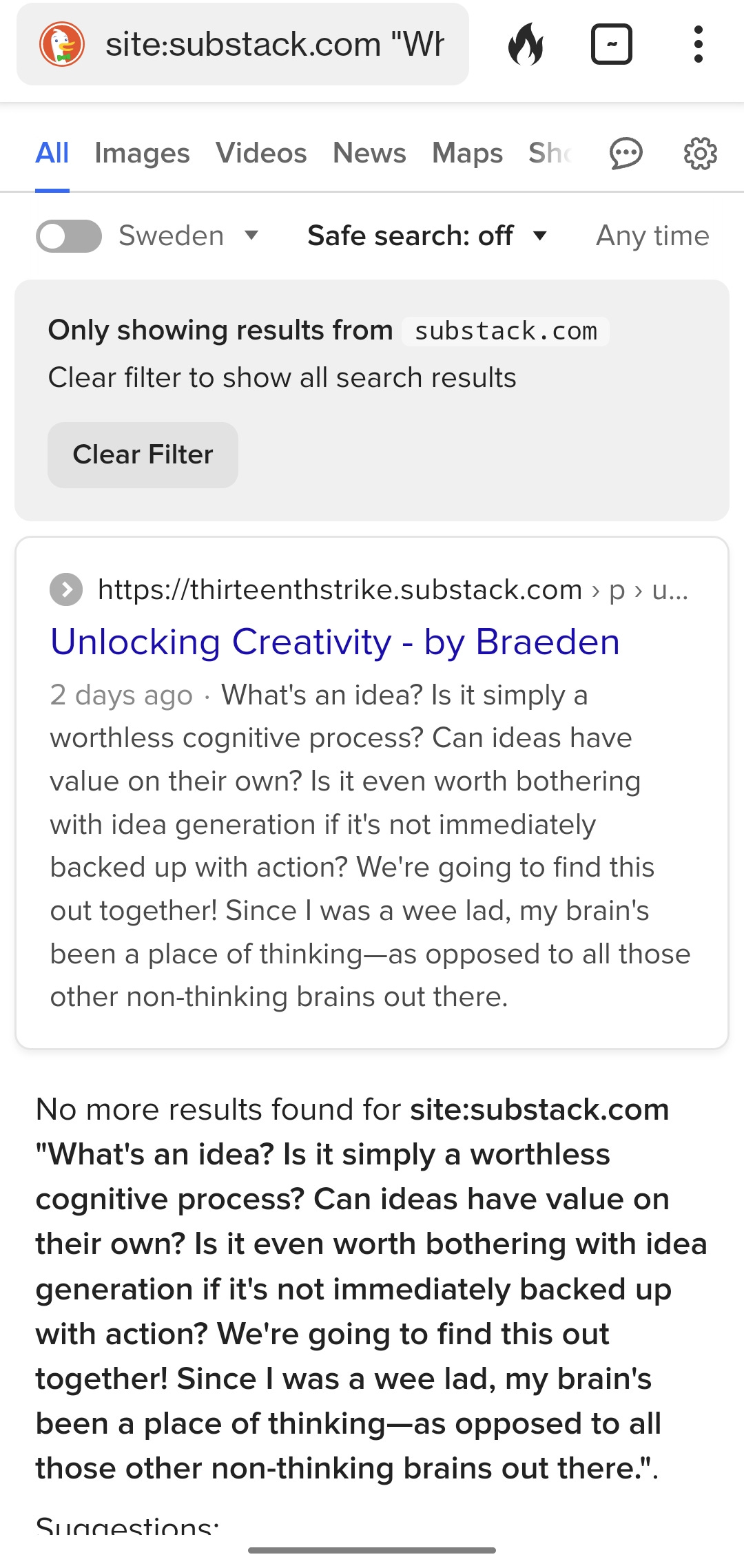If we look at the past, we're living in the future.
#im14andthisisdeep — to my surprise, this exact reference had previously been, well, referenced, on Substack:
Part of living in the future—henceforth to be referred to as the present—means that the Internet has evolved in many different ways. With Substack Notes, Substack has seemingly taken a step or two backwards—or is it really backwards? I'll leave it to you, my faithful and fearless Truthonauts to decide. I give you the info, you give me your opinion.
Introduction—What Are Substack Notes?
I think I'm a bit slow to the party—this often happens when you're trapped engaged in your own world and/or forced to interact in the real world (it's really not that bad once you get used to the mosquitoes).
Did you know that your Substack Notes are not indexed on the wider Internet? Do you perhaps not know what this means? We'll go through it now, and then you can decide if it's positive, negative, other—for your own Substack growth as well as for Substack as a whole. And for the record, your articles on Substack are indexed on search engines (Google, Bing, Yahoo!, Baidu, Yandex, DuckDuckGo—yes there are others, these are the 'Big Six', so to speak).
Substack Notes, for anyone not in the know, are Substack's short-form writer's feature. Think of Notes as a more civilised and intelligent/thoughtful Twitter thread system. There are of course still memes, funny posts as well as other political and other commentary, however, the content posted to Substack Notes is much more thoughtful overall (
accurate characterisation?). They can, and often are, used to post updates on Substacker's other published, or soon-to-be-published works (podcast episodes, audio/video content, books about to be or already published, courses).One critical aspect of Substack Notes that hasn't been widely discussed is their lack of search engine indexing. This became apparent to me recently when I tried to search for a specific Note I wanted to reply to but couldn't remember who posted it. Despite copying the text and using various search techniques, the Note remained an elusive little bugger in search engine results.
There's a search engine trick you can use if you want to search for text on a single website. I encourage you (Truthonaut or not) to try this for yourself—one, to help keep me accountable and to ensure this entire article isn't based on a false premise, and two, just to practise a new skill. This is commonly referred to as ‘Google dorking’. Although the name implies this will only work with Google, you'll be happy to know it should work with most, if not all search engines. The syntax is as follows:

Note from whence the example hailed:
Substack Notes—Current Scenario and Implications for Writers
As I mentioned before, Notes are akin to a Twitter thread (X, a thousand apologies, Elon—not really, though, I still find 'X' to be pretty cringy). They're designed for brief interactions and updates within the Substack community. Notes appear on your 'Home' screen feed of the Substack app as well as on your Substack profile. However, they're not indexed by search engines.
Not being indexed by search engines means that none of the Notes that you post on Substack will show up in Google (or any other search engine, for that matter). If we take two test cases you'll understand exactly what I mean.
Notes text indexing test
Copy the text from one of my Notes or your Notes (anyone's) and then use the Google docking method from earlier to search for that text. If you use double quotes ( " ) around the text it shouldn't matter if you include the 'site:substack.com’ or not. This just ensures you're searching on Substack only (because someone could, in theory, copy your Note text and paste it on another website that is indexed and we don't want to include those. There should be zero results.
Article text indexing test
Perform the same as above and use a block of text from one of mine, yours, or anyone's articles. Below are screenshots of the results I received.
As we can see from the above examples, my Note is not visible. Just to be certain, I picked a Note that is five days old at the time of writing. This was just in case it hadn't been indexed yet. I tested using both DuckDuckGo as well as Google.
Whereas my article from two days ago shows up perfectly fine when I employ the Google docking technique shown earlier:
What are the Implications for Your Writing?
The way I see it, it's a double-edged sword. I think it also depends if we want to focus on the short or long term impacts indexing Notes on search engines would have. I see there being two main camps—those who want to maintain the integrity of Substack and those who want more eyes on their short-form writing.
The more I think about it, the more I begin to agree with Substack's decision. I feel as though the type of people who find Substack via Google or whatever other search engine are finding the articles, are funneled nicely for Substack’s overall demographic. These articles for the most part are the higher quality, curated writing—enticing people who are more likely to uphold the aspects of Substack that arguably make it the best place, overall, online to write on.
This is not an, oh mah gawd Substack perfect, type of article—I most certainly see issues and areas for improvement. That said, I think the team are doing well, considering.
Substack's Intentions and Justifications
The design choices surrounding Notes are intentional. This setup was no accident. Notes are specifically intended to foster engagement within the Substack community. The rationale behind this is to emphasise community interaction over search engine visibility.
Getting started on Substack Notes
Where do my Substack notes appear?
If anyone has the link to a Note, they can view it whether they have an account, or are logged in to Substack or not—the Notes just won't appear through Google searches.
Strategic Considerations
With all the above in mind, it’s essential to balance your use of Substack Notes with other "content" strategies (I'm aware some Substackers are sensitive to their writing being lumped under the same category as TikTok or YouTube videos).
And hey, look on the bright side. You don't have to worry or burden yourself with making your Notes “SEO optimised,” which I know is a big plus for me! Save all that SEO optimisery for your articles and keep it in the back of your mind that Notes are for Substack eyes only. It'll help with knowing your audience at least!
Think about if Substack was a mullet. Where all the search engine indexed content is the “business up the front” and Notes is the, “party at the back”.
Conclusion (The End is Just the Beginning)
Understanding Substack Notes (and Substack in general) is a crucial step in being able to optimise your writing (content) strategy. Notes offer really valuable engagement within the Substack community/ecosystem—more valuable than perhaps even Substack Recommendations:
This article was designed to help you make informed decisions about where to invest your time and energy- more to the point where nowt to invest your time along your writing journey.
That’s it for now, as always, good luck, stay safe, and be well!
See ya!


















Share this post